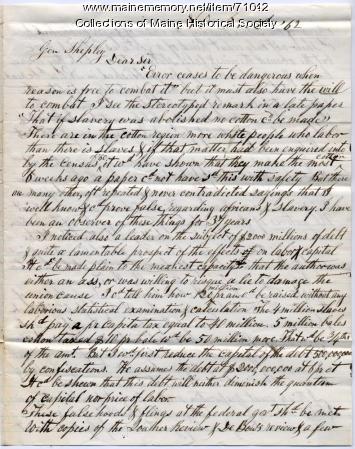
Letter to Col. Shepley on circumstances in New Orleans, 1862
Item 71042 info
Maine Historical Society
Negotiating the political climate of occupied New Orleans and of Louisiana while the war continued could not have been easy for Shepley and other Union military personnel.
Many of the issues they faced preceded the war and Shepley often heard from people on various sides of the political and economic issues.
Henry A. Sample wrote to Shepley in June 1862, shortly after Shepley became military governor of the state.
Sample discussed the cotton economy, debt, unreliable newspaper reports, and the prevalence of "musketoes having a full chance at me." He noted that he lacked sleep because of the pesky insects.
Sample, who wrote a number of times to Shepley, may have been from Maine.

Thank you note for Shepley donation, New Orleans, 1862
Item 72082 info
Maine Historical Society
In the midst of the political issues, Shepley financially supported various schools and other social services, perhaps to help offset the devastating effects of the war and the negative feelings in some quarters about the Union occupation.
In July 1862, Mary E. Randall, secretary of the Board of Managers of the Children's Home of the Protestant Episcopal Church in New Orleans, thanked Shepley for a $50 donation.
She wrote, "The present Financial distress of the City, renders this unsolicited donation truly acceptable."

Gen. G.F. Shepley on diplomatic relations, New Orleans, 1862
Item 73721 info
Maine Historical Society
A continuing issue -- for residents of Louisiana and for the Union forces -- was seizure of property or assets that would aid the Confederate cause.
Shepley wrote to Secretary of State Edwin M. Stanton in September 1862 about $800,000 that Gen. Benjamin Butler had seized from the Consul of the Netherlands.
Shepley wrote that the money would be returned and assured Stanton that he would "endeavor in my intercourse with the foreign consuls in new Orleans as far as possible to avoid any causes of irritation."

Gen. G.F. Shepley to Edwin Stanton on Spanish ship, New Orleans, 1862
Item 74469 info
Maine Historical Society
Secretary of War Stanton and Brig. Gen. Shepley were frequent correspondents about the many issues facing occupied Louisiana and the troops there.
This letter relates to correspondence between the State Department and the Spanish minister.
The Spanish government apparently was protesting an incident or incidents at the home of Spanish citizens Mssrs. Avendano.
Shepley explained that the brothers were engaged in trade with the "Confederate Government so called" to supply arms and munitions imported from Havana in return for cotton, in violation of the Union blockade.
Union forces had seized a Confederate ship, the Fox, its cargo and a bank draft for £1900, which Shepley reported were the proceeds of the cotton cargo that was part of the deal with the Spanish.

Loyalty oath to U.S., Louisiana, 1862
Item 74502 info
Maine Historical Society
Among the controversial policies instituted by the occupying Union forces was the requirement that Union residents were attest to their loyalty to the United States, or have their property seized because they were not loyal to the U.S.
Gen. Benjamin Butler -- nicknamed "Beast" Butler by many in the state -- commander of the Department of the Gulf, required those who did not sign to provide a list of their property -- and be considered enemies.

Lincoln letter on Louisiana elections, Washington, 1862
Item 79086 info
Maine Historical Society
President Abraham Lincoln wrote to Shepley about possible elections in that state, which was under Union control during the Civil War.
Lincoln noted that his goal was to have Louisiana residents willing to swear to support the U.S. Constitution be elected -- and that there was no point in having northerners named as Louisiana representatives to Congress.

Gen. G.F. Shepley on Louisiana elections, 1862
Item 74532 info
Maine Historical Society
In December 1862, Shepley wrote to Stanton concerning whether it was time to hold elections for Congressional representatives from the first and second districts.
He reported that many residents of the two districts had taken loyalty oaths to the U.S. With a sufficient military force in Louisiana, he believed the rebels could be ousted and "the people would cheerfully soon return to the Union..."

Capt. Thornton to Gen. Shepley on private matter, Washington, 1864
Item 76538 info
Maine Historical Society
Shepley got entangled in various controversies in Louisiana. Among the most contentious was when Louisiana would be able to rule itself -- and elect representatives to the U.S. Congress.
Capt. Charles Thornton of Scarborough, formerly of Co. C of the 12th Maine Regiment, who was serving on Shepley's staff, wrote to Shepley from Washington, D.C., about a private dispatch he delivered to Secretary of War Edwin Stanton.
The dispatch apparently referred to some charge against Shepley. Thornton reported that Stanton's response to the charge was, "Slander Captain nothing but slander."
Thornton wrote, "The scoundrel Cottman started the infamous slander." He probably refers to Thomas Cottman, a Louisiana planter who had signed the articles of secession, but in 1864 was pressuring Lincoln and others to allow Louisiana to keep its old constitution and hold new elections.

Program for Louisiana inauguration, 1864
Item 76597 info
Maine Historical Society
Finally, Louisiana's internal political struggles over electing a civilian government that could be readmitted to the union settled out and elected Michael Hahn, a Republican, as governor.
Hahn was an opponent of secession and collaborated with the Union occupation of Louisiana.
Hahn was inaugurated on March 4, 1864. Shepley then resigned as military governor and was given a new post in Virginia, again serving under Benjamin Butler.
This slideshow contains 9 items

